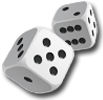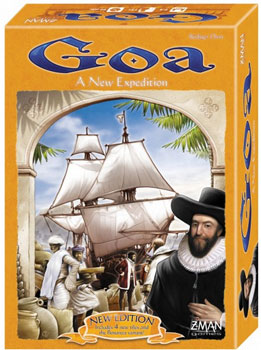



play board games
Board game reviews, strategy tips & session reports
Goa Board Game Review
 Stats:
Stats:
No. of players: 2-5
Amount of time to play: 90-120 min
Age requirements: 12+
Set-up time: 5 minutes
Goa is an auction and resource management game. You must buy tiles at auction and decide where to act and use your resources to advance your capabilities and score VPs.
Goa Rules Description:
Goa lasts eight rounds. Four rounds for phase A and four rounds for Phase B. Different tiles are available to be put up for auction in Phase A and B. Other than that the two phases play the same.
You start Goa with some money ($5 for player one and $10 for everyone else), two colonists and four ships. Each round in Goa has two parts. In the first part you auction tiles and in the second part you take three actions.
The tiles you bid on include plantations, ships, colonists and tiles that grant you resources once or throughout the game. These tiles are arranged in a five by five grid. The first player must place the flag with their token numbered one in an empty space in the grid or off the board next to a tile. In clockwise order players place their ascending numbered tokens on tiles they want to auction. These tiles must be adjacent to the last token placed. The first player then places one the last token on a tile and the auctions begin. The first player flag is up for auction first. The winner is the new first player and gains an extra action card. Next you auction the number two token and follow the numbers in ascending order.
Auctions start with the player left of the auctioneer. You can pass or bid and each bid must be at least $1 more than the last one. The auctioneer has the option to buy the tile and pay one less dollar than they bid. If they win they pay the bank. If another play wins they pay the auctioneer.
After the auction the action half of the round begins. Each round you start with three actions. The player that won the first player flag takes the first action. Play continues in clockwise order. There are six actions you can take, progress, build ships, harvest, taxes, expedition or found a colony. Some tiles and actions let you gain extra action cards. They allow you to take an extra action once all players are done with their initial three. You may only hold one extra action card and must use the others in the round you gained them.
Progressing in your development board increases the efficiency of the rest of the actions. It also scores you VPs at the end of the game. This action requires ships and certain spices. When you build ships you take them from the supply and add them to your hand. The harvest action lets you add spices to empty slots on your plantations. Collecting taxes gets you more money. The expedition action let you draw expedition cards. These cards have special actions on them and also six different symbols on the bottom. Collecting more cards with one symbol and holding onto them until the end of the game scores you VPs. Finally there are four colonies you can establish. This requires colonists. The colonies are like plantations and can hold spices. Also the more you have the more VPs you score.
After eight rounds the game is over. You tally your VPs for progressing on the development board, number of colonies, expedition card symbols and any other tiles that might grant you points. Also the player with the most money remaining gets 3VPs. You win if you have the highest total VPs.
Quick Review of Goa:
Goa is has a unique auction system that requires some thought. You always feel like you need more actions and most every action seems very important. The game is well designed and fun to play. And for all that is going on it is straight forward to learn and teach.
The components for this game are high quality. The tiles and tokens are nice and thick and the art work looks good. The rules are well organized and easy to read with lots of examples. I have a super small nitpick about the board. I wish there was a track for marking the round and which action you are on. They do provide tiles for this, but something on the board would be less fiddly. Again this impacts the game in no way and would be nice to have.
I really like the way the auction system works. Picking the tile you want to auction is tough. If you constantly pick the tile you want you won’t make much money. But choosing something you don’t want but hope someone else will put it up for auction is risky. Plus then you pay them for the tile and they get more cash. It is just such a well-designed and yet tricky system.
Developing your board to get more efficient actions is important and challenging. Do you concentrate on one or two tracks to score more points or try a more well-rounded approach? Some of these decisions might be answered by the tiles you win.
Goa is a really fun auction game with an excellent auction system. The resource management and action selection make this game tense and every decision meaningful. If you like auction games buy this. If you are a fan of Eurogames in general you should try this out.
Score and synopsis: (Click here for an explanation of these review categories.)
Strategy 5 out of 6
Luck 3 out of 6
Player Interaction 3 out of 6
Replay Value 5 out of 6
Complexity 4 out of 6
Fun 5 out of 6
Overall 5 out of 6

Leave a Reply